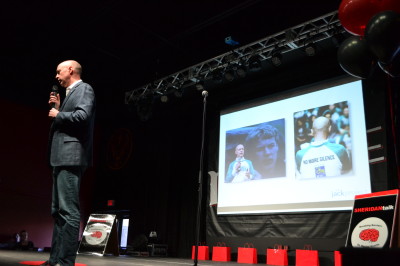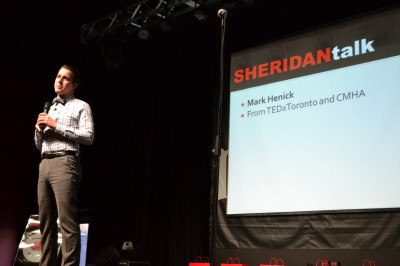SHERIDANtalk helps break mental health barriers
STORY AND PHOTOS BY DARYLL HINVES
SHERIDANtalk started the mental health conversation last night and inspired Sheridan students, staff and faculty to make a difference and become mental health advocates.
Inspired by the popular TEDtalks, Sheridan’s Health and Wellness Peer Mentors created SHERIDANtalk, focusing on the Canada-wide mental health epidemic. Partnering up with Unleash the Noise, a mental health innovation summit organized through The Jack Project, guest speakers and Sheridan students brought the conversation into the open at the Trafalgar Campus Marquee.
The interactive event encouraged the audience to get to know one another, talk about their experiences and find common bonds. Cheryl Cnoop-Koopmans, a Sheridan Student Services counsellor and SHERIDANtalk organizer, talked about how mental health affects everyone.
“While we all have our differences, this shows you we all have our commonalities as well,” she said. “All of us have our own mental health.”
Eric Windeler, founder of The Jack Project, talked about the importance of having the “mental health conversation,” something he never had with his son, Jack, who died by suicide while studying at Queen’s University in 2010.
Windeler got the audience to participate in cell phone polls, in which the audience would text an answer to a specific number, and the results were displayed on screen in real time.
“As tough as a sex-ed conversation is, the conversation happening in rooms like this is even tougher to have,” he said. “The conversation about how you’re really feeling about mental health, how you think a friend may be feeling, how you think a person like you feels.”
Another poll was shown on the screen, asking the audience if they have ever had the “mental health talk”; 80 per cent said no.
Following his son’s suicide, Windeler wanted to get a conversation going, and he began to share his story with the help of Kids Help Phone. In 2012, Windeler teamed up with Queen’s University to create Unleash the Noise, a student-lead mental health summit across Canada.

Eric Windeler, founder of The Jack Project, advocates the importance of mental health, following the death of his son, Jack, in 2012.
Erin Hodgson, a University of Toronto grad and mental health advocate for Unleash the Noise, shared her story about struggling with obsessive-compulsive disorder and depression, and why she wanted to talk about mental health.
“We all have mental health, and it’s okay to talk about it,” she said. “These young people are going to become a generation without stigma, and so will you if you keep this conversation going.”
Arthur Gallant, Bell Canada’s 2013 Faces of Mental Health spokesperson, told the room of more than 100 about his experiences with bullying, mental illness, life with his mentally ill mother, nine years in foster care and his passion for mental health advocacy.
“Advocacy is so much more than just speaking up,” he said. “ It’s about negotiating and refusing to accept the status quo. Many people don’t realize is that we are all advocates. You all being here tonight makes you [mental health] advocates.”
“Three years ago a former employer told me I would have never been hired if he knew I was gay,” said Gallant. “Several months later that same employer said I should not be allowed to work if I was depressed, because depression is an illness and people who are sick should not be at work. I took legal action, and I can guarantee that is never going to happen again.”
Mark Henick, a 26-year-old Canadian Mental Health Association advocate and Mental Health Commission of Canada board member, shared his experiences with mental illness, his TEDxToronto appearance, and suicide attempt as a teenager.
“I realized through the process of doing my TEDtalk, I was grasping for something, for some sort of control, for some sort of perception of my life,” said Henick. “I felt like even if nothing else was in my control, my life was in my control.”
Henick encouraged the audience to deal with their problems through conversation, seeking professional help, and that opening up about feelings is nothing to be embarrassed about.
“The economic impact of mental health problems and their addictions is more than that of all cancers combined,” he said. “You tell me: which gets more of the funding, which gets more of the attention, which gets more of the conversation?”

Mark Henick, formerly the youngest president of the Canadian Mental Health Association and TEDxToronto speaker talks to the audience about mental health advocacy.
Following the professional guest speakers, Sheridan students took to the stage.
Catia Mendes, a 23-year-old Social Service Worker alumni from Davis Campus, spoke about bullying, high school and what life looked like before Sheridan, for the first time in front of an audience.
“Because of the pressure of wanting to know where I would go in life, I lost confidence,” she said. “I didn’t know what was wrong with me and for a very long time, I was really sad. I didn’t know what was wrong with me, and happiness seemed so hard to achieve.”
After her second year at Sheridan, Mendes finally saw a counsellor.
“I remember walking through the halls at Davis, coming closer to that door, and thinking, ‘Counselling is for crazy people, I’m not going there,’ ” she said. “I spent all these years, from age 15 until now, thinking about ending my life. Up until November 2012, I kept trying to end my life because I didn’t believe I deserved to be here right now.”
Although it took a lot of courage, Mendes is grateful for therapy sessions, and is more confident talking about her mental health.
Michael Modica, a Toronto Argonauts medical staff member and 2013 Athletic Therapy Alumni, also from Davis, spoke about the stigma behind seeking therapy, and dealing with anxiety and ADHD.
“The first obstacle in mental health was my decision to seek counselling,” he said. “Growing up in my family, seeking counselling was something that was not encouraged, and asking for help meant weakness, and therapy meant you were crazy.”
Even though he was apprehensive and embarrassed at first, Modica thrived in group therapy, and has used coping skills he learned to improve his well-being and improve the quality of his life.
“I now feel like I’m in control, and I also feel that besides seeking counselling, you can get support from your family and friends.”
Mental health doesn’t have to be something you struggle with personally, it can be something that affects someone close to you.
Justine Howard, a third-year Bachelor of Animation student at Trafalgar, experienced the pain of watching a loved one deal with mental illness when her sister Chantal, who was 17 at the time, was diagnosed with anorexia in 2011, and attempted suicide.
Originally from St. John’s, Newfoundland, Howard was in disbelief when her parents told her about her sister’s rapid weight loss and mood swings while Howard was away at school.
“At first, I couldn’t believe what I was hearing, because it was so unlike her,” she said. “When I returned home at Christmas, it shocked me to see how little my parents had been exaggerating.”
Chantal’s body was skeletal, her hair grew thin, and she harmed herself.
After a suicide attempt in 2012, Howard and her family now know that Chantal had been depressed since age 9, following their parents’ divorce.
“It amazes me that somebody can suffer for that long without anybody noticing,” she said.

(left to right) Eric Windeler, Erin Hodgson, Mark Henick, Arthur Gallant, Justine Howard, Catia Mendes and Michael Modica take questions from the audience.
As the student speaking wound down for the evening, Kevin Flynn, MPP of Oakville and newly appointed Ontario Minister of Labour, made a surprise appearance and spoke about the importance of talking about mental health, and praised SHERIDANtalk
“I don’t think that any parent in this province or country is prepared for when their child has to deal with a mental health issue,” he said. “My generation simply chose to not talk about it, and the generation before mine talked about it even less. Everyone’s presence this evening shows how far we’ve come in such a short time.”
SHERIDANtalk was sponsored by the Sheridan Student Union, and offered free food, drinks, breakout discussions and activities. All those who attended will receive a certificate of attendance, showing they have broken the barriers of stigma.




